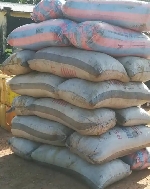World Bank says cedi 4th weakest Sub-Saharan Africa currency
 The cedi has lost approximately 24% of its value against the US dollar, making it the fourth weakest currency in the region
The cedi has lost approximately 24% of its value against the US dollar, making it the fourth weakest currency in the region
The Ghana cedi and three other currencies have been identified as the worst performers in Sub-Saharan Africa (SSA) in 2024, according to the World Bank’s October 2024 Africa Pulse Report.
The cedi has lost approximately 24% of its value against the US dollar, making it the fourth weakest currency in the region.
The report also highlights South Sudan’s pound (over 60% loss), Ethiopia's birr (51%), and Nigeria’s naira (over 40%) as the worst-performing currencies this year.
In contrast, the Kenyan shilling has emerged as the best-performing currency in Africa, showing a year-to-date appreciation of about 21% as of August 2024.
"Ethiopia, Ghana, and Nigeria are among the worst-performing in Africa this year, with their currencies continuing to weaken under mounting pressure for foreign exchange," the report stated.
It further explained that by the end of August 2024, the Ethiopian birr, Nigerian naira, and South Sudanese pound had experienced significant depreciation.
The Nigerian naira, in particular, lost around 43% of its value due to the central bank's heightened demand for US dollars in the parallel market, limited dollar inflows, and slow disbursement of foreign exchange to currency exchange bureaus.
On the other hand, some currencies that weakened in 2023 have seen a recovery or stabilisation.
The Kenyan shilling’s 21% appreciation stands out, while the South African rand and currencies pegged to it have strengthened by 3.1% this year, after significant losses in the previous year.
Despite these improvements, the report warns that exchange rate pressures and foreign exchange shortages remain major concerns for African policymakers.
More than a third of the 30 countries and two currency unions (the Economic and Monetary Community of Central Africa and WAEMU) surveyed are expected to have less than three months’ worth of import cover in international reserves by the end of 2024.
Trending News

US announces 'another $1.7m' for Ghana via LEAP to aid recovery from recent drought
14:39
ICC's chief prosecutor arrives in Ghana
11:17
Police refutes 'mis/disinformation' about Oliver Baker-Vormawor's visit to Police Hospital, its expenses
01:56
MOWAG to renew strike over unresolved grievances
12:04
GAF and small-scale miners collabo not for the moment but for the future: Concerned Small-Scale Miners
12:49
Akufo-Addo, Bawumia and NPP can’t stop galamsey – Afaglo
15:05
A/R: 13 perish in accident near Obuasi
12:54
Day-2 of Operation Halt 2 storms Pra river galamsey site destroying 10 changfans, 10 water pumps
02:14
UE/R: Tensions rise as four security agencies clash over smuggled cocoa beans in Bawku
16:03
NDC Youth Organiser donates to support campaign efforts in Eastern region
12:45



